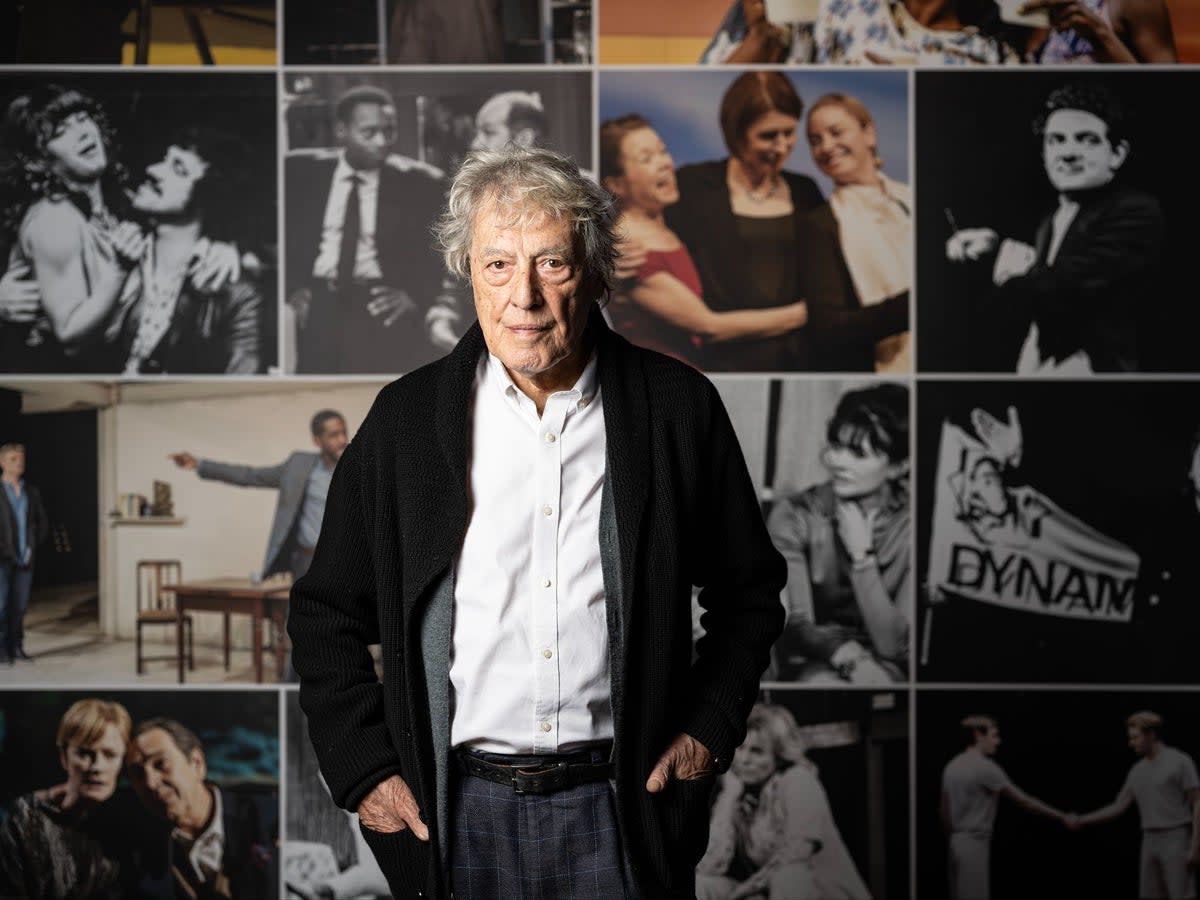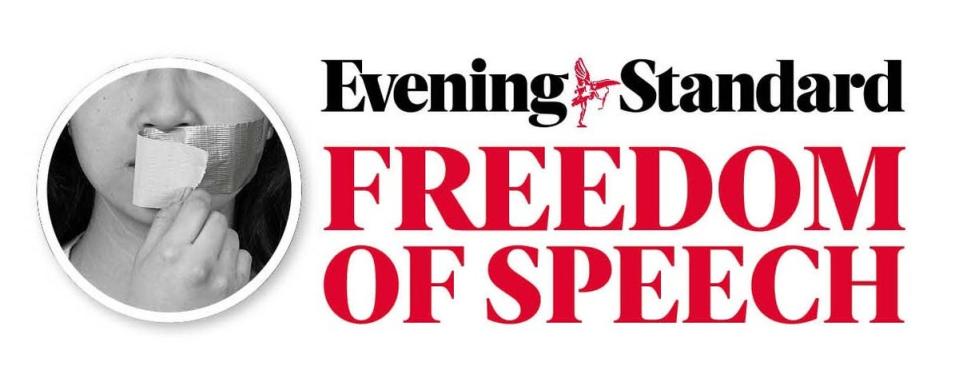Tom Stoppard: ‘To stop a writer’s freedom is outrageous’

- Oops!Something went wrong.Please try again later.
“I grew up in an England which I learned to revere as being a place where certain virtues were actually invented, and free expression in the public print was one of them,” says Sir Tom Stoppard, arguably Britain’s greatest living dramatist. But Sir Tom is worried that the world of letters that he has worked in for almost seven decades isn’t as free as it used to be. “People are now deemed to be much more needful of protection from any kind of a rebuke, reproach, criticism,” he says. “There’s a great sensitivity about how you can talk about anything which might obscurely offend part of the readership.”
We’re sitting underground at the Hampstead Theatre, where the 86-year-old has just come out of a rehearsal for a revival of his play Rock’n’Roll, which debuted at the Royal Court in 2006. Before we chat, the author of school staple Rosencrantz and Guildenstern are Dead and Oscar-winning scriptwriter of Shakespeare in Love generously pulls out a chocolate mint bar for us to share. Munching on it, we discuss the new production, and why he wanted to be involved in the Evening Standard’s Freedom of Speech campaign.
Sir Tom is a great believer in Britain, particularly for its freedoms, which he once felt we did better than most. Born in what was then Czechoslovakia, he arrived here at the age of eight, via stops in Singapore and India, after his Jewish family had been forced to flee on the day the Nazis invaded. That difficult youth gave Stoppard a lifelong admiration for our free press, and he proudly started a first career in journalism before writing drama.
Throughout his career, he has tackled repression around the world. Rock’n’ Roll is inspired partly by the jailing of playwright and Czech statesman Václav Havel. So when he sees repression at home, such as when London Assembly member Andrew Boff was escorted out for mild heckling at October’s Tory Conference, Stoppard says he finds it “disturbing”.
'Freedom of speech is the freedom which made all the other freedoms possible'
Tom Stoppard
Like most of Stoppard’s work, Rock’n’ Roll is stuffed with ideas. Set between Cambridge and Prague at the end of the last century, it explores differences between East and West in the Cold War, the power of rock music versus politics, and the intrusive UK tabloid press. It also passionately champions free expression.
At the time of writing the play, Stoppard was involved in a campaign against an oppressive regime in Belarus under Lukashenko — which has only become more allied to Putin’s Russia in the intervening 15 years. His friends in Belarus then thought of England as somewhere where you were “free to say what you liked about the government or anything else”, Stoppard says. But even at that time, he remembers Richmond Labour member Walter Wolfgang being dragged out of home secretary Jack Straw’s conference speech for a heckle over Iraq. “I thought, do I find this an embarrassment? And on the whole I did.”
He still feels that the UK is better than many places, but thinks that needs to be preserved. “Thank God for us, we actually live in a country where there is freedom of speech in politics, and we’re looking at countries all over the place where there is not freedom of speech.”
Stoppard says his mantra has been that “freedom of speech — by which I mean expression, by which I mean writing as well — is the freedom which made all the other freedoms possible”. And he feels there has become increasing encroachment on that by both state and society. There should be limits on speech by the state, but these should go back to being governed more by “common sense” which he calls himself a “great believer” in. In his youth as a journalist “the phrase ‘hate speech’ didn’t exist as far as I recall”, he muses.
Because of his connection to a world behind the Iron Curtain, he has skin in the game. “I think of myself as being some kind of observer of where the lines and frontiers of permissibility lie, and I’m horrified by the idea of finding myself living in a society where you have to watch your step,” he says.
'When I hear somebody say something which I think is wrong, the last thing on my mind is: ‘This shouldn’t be allowed'. I just hope somebody tells them'
Tom Stoppard
The playwright is also one of those who feels there is a “cancel culture” around limiting what people say. “When I hear somebody say something which I think is wrong, the last thing on my mind is that, ‘This shouldn’t be allowed, nobody should be allowed to write this’. I just think, ‘He’s wrong, and I hope somebody is telling him’,” he says, and adds: “The way I was brought up was that you can say anything you like, and then anybody can tell you are talking nonsense, and to speak better.”
Stoppard’s politics are complex. As a younger man, he was seen as further Right than many in the arts, but has said he moved Left with age. He’s often railed against intrusion into privacy, such as the high levels of CCTV in the UK, and the collection of data on users by big tech companies. And as a writer, limits on language are particularly aggravating.
“The sensitivities are much more to do with what you call something and what word you can apply to a status or situation,” he says. “To me there’s always been a kind of absurdity in somehow running away from ordinary language,” he adds, and twice quotes a fellow author whose name he can’t remember saying, “Writers are allowed to write about absolutely anything they like, and to say otherwise is outrageous”, rolling the final word with relish in his English public school voice.
These boundaries on speech even affect his domestic life. “I keep being told, ‘Oh, you can’t say he’s fat’. And I’m saying, ‘But he is fat, and what am I supposed to say instead?’.” When I ask who tells him that, Stoppard mentions his third wife, brewery heiress Sabrina Guinness, who he married in 2014, and who he says is more aware of society’s “red flags” than he is.
Stoppard is glad not to be on the internet, where he can’t see most of the criticism of things he says. He did sign an open letter in defence of JK Rowling, joining other writers like Ian McEwan calling out the “onslaught of abuse” against the Harry Potter author for sharing views on transgender issues, which the writers called an example of an “insidious, authoritarian and misogynistic trend in social media”. In doing so, Stoppard was again standing up for free speech.
“I didn’t actually have an opinion about sex and gender. I’m not sure even now that I have one, since I’m so remote from the question, but it was instantly clear to me that she committed no transgression by speaking her mind,” he says.

Rock’n’Roll has several “open letters” which some characters choose to sign, and others do not. The play also has an impassioned speech by a character who says England has “lost its nerve” and feels compelled to constantly “apologise for history”. Could such criticism apply to things like the recent visit by the King to Kenya, where he expressed regret for some of our colonial history? “I think apologies should be saved for situations where you’re culpable of something,” Stoppard says.
Smaller irritations about a less free society also permeate our chat. The writer says he is far more indiscreet about sharing backstage gossip in public appearances now, for fear his words will be shared online, and thinks there’s “something sad” about that. He also misses smaller things, like freedom to park without meters in Central London, and no restrictions at airports. “I'm really, really glad that I didn't miss the kind of society which I lived in when I was 20, and 30, and 40” he says, when “civilised life used to be more civilised – now it's more socialised”. In a media world governed by public relations managers, he’s unusual, calling me directly to arrange our interview.
One reason for Stoppard’s focus on free speech can be traced back to the vital importance of free debate in his plays, where characters constantly argue the toss on everything from chaos theory to Romanticism. “I've always sort of tended to write both sides of an argument, because I'm not quite sure until I kind of hear it or read it where I stand anyway” he says.
And while he has genuine concerns, Stoppard always has a twinkle in his eye as he talks. “There’s a great pleasure… in being jointly outraged with somebody else about some third party” he says with not a little glee. “We now live in a world where it's an item of gossip to pass on the latest absurd example of some piece of speech constraints for wokery reasons. And you're kind of swapping these as some people swapped photographs on Instagram.”
One area that Stoppard surprises me is his lack of opposition to Rishi Sunak’s recent smoking ban. Sir Tom is one of England’s great smokers, his striking looks often set off with a cigarette over the years. I assume he’ll condemn the draconian rule, but he doesn’t, saying he only smokes because he started young, and continued because he connects the act with writing. “I'm an addict. If there was a smokers’ anonymous, I’d be there” he says. “Young people shouldn’t smoke”.
With plays like Arcadia still widely performed, Stoppard surely has a good case for being our most likely candidate to win a Nobel Prize for Literature, but he bats away praise of his pedigree. Rock’n’Roll has an intriguing personal aspect, as in its first run, the two lead female roles were played by and written for Sinead Cusack, wife of Jeremy Irons, who Stoppard was in a relationship with at the time. The eight-week run with a new cast began on Wednesday.
'I used to be much more hands-on when I began, almost a control freak'
Tom Stoppard
In rehearsals, Stoppard has been tweaking the script, taking out a reference to a form of poetry he thinks no one will understand. He lets actors change things too, which he wouldn’t have done in the Sixties. “I don’t feel I’ve got to hang on to everything,” he says. “I used to be much more hands-on when I began, almost a control freak.”
He’s not sure what he might do next. Stoppard recently talked of having writer’s block, but now says he has a topic he’d like to pen a play about, but that “I just somehow haven’t cleared my decks enough” to start on it. The playwright is somewhat constrained by his back catalogue, which contains very few flops, so it’s important the standard doesn’t drop. His most recent work, Leopoldstadt, addressed his 20th-century Jewish family history more personally than he’d done before. Despite the pandemic, it was a huge hit, with many feeling it was a masterful late flourish.
Following that is hard. “I may have lost the capacity to recognise a great falling off,” he says. “There are many examples of writers in their nineties or eighties who seem to not be aware that their new work is rubbish.” He mentions the late American novelist Cormac McCarthy, whose work he loves but whose final two novels were less arresting. “They are the work of a spent force,” Stoppard says. He seems far from one himself.
Rock’n’Roll is at Hampstead Theatre until January 27

